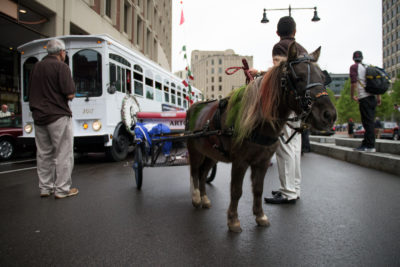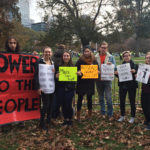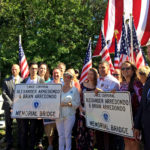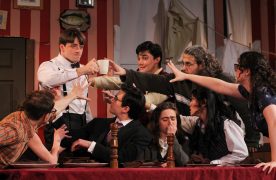
During the 80th anniversary of Columbus Day this past weekend, Bostonians took to the streets in celebration as well as in protest.
To many revelers at the Columbus Day Parade on Sunday, the federal holiday is a celebration of Italian-American heritage and contributions to American society. To those rallying at Boston Common on Saturday in support of implementing Indigenous Peoples Day, the holiday perpetuates an idealized image of a man they view as sparking the genocide of Native Americans.
Jean-Luc Pierite, president of the Board of Directors at the North American Indian Center of Boston, said changing the name of Columbus Day is a necessary step to reconcile history.
“People know about the rape [and] all of the atrocities that were committed, but what has happened over the past few decades is that we have seen this thin veil of idolization of Christopher Columbus as a national hero,” Pierite said. “What this has done is not only sugarcoat his legacy, but also discredit the indigenous version of history, our perspective.”
Pierite said the Indigenous Peoples Day initiative is about remedying disparities between indigenous people and the nation they live in, while also shedding light on overlooked indigenous issues.
“[In Boston], we still have effects from King Philip’s War, a war fought between the Native people and the settlers over 300 years ago,” Pierite said. “And yet, 12 years ago, the state of Massachusetts repealed a law that said it was illegal for Native Americans to be here in Boston, the Indian Imprisonment Act.”
Antonio Sestito, the president of the Grand Lodge of Massachusetts Order Sons of Italy in America, said the debate about naming Columbus Day is less about the actions of Columbus and more about commemorating Italian heritage.
Sestito said Columbus Day was founded by President Franklin D. Roosevelt in 1937 to recognize Italian-Americans for their contributions to the United States.
“They put Columbus on [the holiday] instead of having an Italian Heritage Day,” Sestito said. “The holiday is more for the heritage than anything else.”
Sestito said people should focus on Columbus’ accomplishments rather than vilify him for his transgressions.
“Columbus opened the door for Europeans to come over [to the Americas], and that led to the country we have today,” Sestito said.
Kevin Caira, the national president of the Social Justice Commission of the OSIA, said the Sons of Italy will continue to defend the Columbus Day name from an impending change.
“There is an Indigenous Peoples Day already,” Caira said. “The United Nations proclaimed Aug. 9 as Indigenous Peoples Day for the world, not just for America. There is also an Indigenous Peoples Month and that is in November.”
Caira said the OSIA were not opposed to Indigenous Peoples Day as a concept.
“We just do not believe [Indigenous Peoples Day] should be on the same day as a federal holiday dedicated to Columbus and his voyages to the Americas,” Caira said.
Caira said the OSIA has routinely received short notice about pending legislative decisions concerning the holiday, and this has inhibited the organization from taking effective action.
At the Columbus Day Parade on Sunday, attendees said they support Columbus Day, but recognize the efforts of Indigenous Peoples Day.
Phil Boncore, 69, of Winthrop, a past national president of the OSIA, said Italian-Americans have adopted Columbus as their patron and the name should remain intact to support the explorer’s legacy.
“All Italian-Americans are proud of their heritage,” Boncore said. “Christopher Columbus has been a symbol of that [pride] since I can remember.”
Susan McPherson, 65, of Quincy, said people have the right to attempt to change the holiday’s name.
“Chances are slim to nil that anything will change, but [Native Americans] should certainly have the right to vocalize,” McPherson said.
At Saturday’s rally, several protesters said they think the atrocities associated with Columbus should not be overlooked.
Nathan Heathman, 25, of Saugus, said the call for Indigenous Peoples Day is important because native genocide is often trivialized by U.S. history classes.
“We still, every year, are expected to have a holiday memorializing the person who killed … the ancestors of people like me all over the country,” Heathman said.
Josiah Contreras, 23, of Back Bay, said due to his Native American heritage, he believes in changing the name of Columbus Day in Boston, which would encourage positive national change.
“Boston is one of the major cities in the U.S., and if we are able to get them to do it, then that will mean something, especially for the East Coast,” Contreras said.














